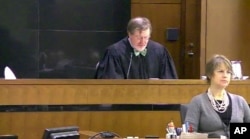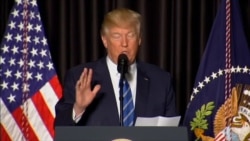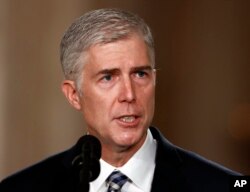U.S. President Donald Trump's nominee to the Supreme Court, Judge Neil Gorsuch, has called the president's sharp criticism of the judiciary "demoralizing" and "disheartening."
Gorsuch made his comments while meeting privately Wednesday with Democratic Senator Richard Blumenthal. Gorsuch's remarks were conveyed publicly by Senator Blumenthal. The essence of Gorsuch's remarks were confirmed by the Supreme Court nominee's office.
The essence of Gorsuch's remarks were confirmed by the Supreme Court nominee's spokesman, Ron Bojean. Citing a statement from Republican Senator Kelly Ayotte, who is assisting Gorsuch as he meets with Senators, Bojean told VOA Gorsuch's remarks were in response to any criticism of the judiciary, and not the president's specific remarks.
"Judge Gorsuch has made it very clear in all of his discussions with senators, including Senator Blumenthal, that he could not comment on any specific cases and that judicial ethics prevent him from commenting on political matters," Ayotte wrote. "He has also emphasized the importance of an independent judiciary, and while he made clear that he was not referring to any specific case, he said that he finds any criticism of a judge's integrity and independence disheartening and demoralizing," Ayotte added.
President Trump reacted to Gorsuch's remarks Thursday on Twitter by apparently questioning the integrity of Senator Blumenthal.
Trump's attack on Senator Blumenthal apparently suggested the lawmaker distorted his conversation with Gorsuch and compared it to misstatements made in his past. During his 2010 Senate race, Blumenthal held a news conference to clarify he did not serve in Vietnam but, instead, served domestically during the war while serving six years in the Marine Corps Reserves.
Gorsuch was asked to react to Trump's Twitter message calling District Judge James Robart, who on Friday put a hold on Trump's executive order temporarily banning travel from seven Muslim-majority countries, a "so-called judge."
Trump told the American people to blame Robart and the court system if "something happens," alluding to a terrorist attack on the United States.
The president also criticized the three-judge panel of the appeals court in San Francisco that is considering whether Robart had the legal grounds to suspend the executive order from being enforced while legal challenges to it continue.
"I don't ever want to call a court biased, so I won't call it biased," Trump said. "The courts seem to be so political and it would be so great for our justice system if they would be able to read a statement and do what's right."
An independent judiciary is spelled out in the U.S. Constitution, and such harsh criticism from a president about the federal court system is rare.
Earlier Wednesday, Trump told a gathering of law enforcement officials in Washington that he acted solely to protect the country when he temporarily banned entry to people from Iraq, Iran, Syria, Libya, Yemen, Somalia and Sudan.
WATCH: Trump Defends Travel Ban
"Believe me, I've learned a lot in the last two weeks, and terrorism is a far greater threat than the people of our country understand," he said.
He even said a "bad high school student" would be able to understand that he had the authority to take the executive action.
Tuesday hearing
The appeals court in San Francisco heard arguments both for and against Robart’s ruling, and said it will make its decision as soon as possible.
The Department of Justice, in arguing in favor of keeping the ban in place, took the position that Trump has the authority to determine who is allowed in the country.
States challenging the ban — Washington and Minnesota — said it separated families, stranded students overseas, and left people in doubt about whether they should travel because of the uncertainty of whether they could come back.
All sides expect the issue to wind up before the U.S. Supreme Court.
Why those seven countries
Homeland Security Secretary John Kelly said last week the countries listed in the ban lack the kind of law enforcement and record keeping necessary to convincingly describe the backgrounds of their citizens, and that the U.S. will be working with them and other nations to “tighten up on their procedures.”
Leon Fresco, the former deputy assistant attorney general for the Justice Department’s Office of Immigration Litigation under President Barack Obama, said there is some merit to concerns about countries not sharing all of their criminal data.
“I think it is always worthwhile to keep pushing, pushing, pushing countries to give us more information on their citizenry so that we can decide if they are people who are dangerous, but it is not worth it to have an outright ban,” Fresco told VOA.
He also expressed support for the existing vetting process, which under the Obama administration took a refugee an average of two years to complete. Fresco said no process is foolproof because it cannot predict a person’s future mindset.
“If a person comes here and then gets radicalized because of the course of time, that’s something very difficult to predict, but it’s not something that you would ban the entire world from coming for the chance that they could one day become radicalized because it’s so few people who end up becoming radicalized,” he said.
Some information for this report was provided by the Associated Press and Reuters.









